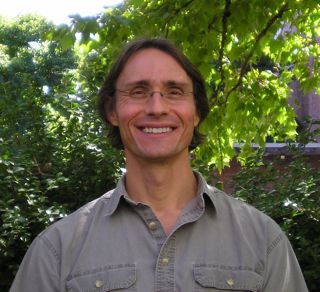8 August 2014
Worried about Speaking in Public? Try Toastmasters. Really.
Posted by mcadams

Darrin Sharp’s Toastmasters talk adroitly connected the global to the local by demonstrating how an increasingly acidic ocean could affect the supply of fish we want on our dinner tables. Photo Courtesy of Darrin Sharp.
By John Calderazzo
That’s right, Toastmasters, the outfit with the retro name that seems to promise insurance salesmen who shake your hand too hard, like that guy in the movie Groundhog Day who keeps pestering Bill Murray. “It’s Ned! NED RYERSON!”
Yes, I was dubious, too.
But then la few weeks ago I actually went to a meeting, thanks to a shy-seeming scientist acquaintance of mine in Fort Collins, Colo., who invited me to join him. Darrin Sharp is a faculty research assistant with the Oregon Climate Change Institute (never mind why he works in Colorado). He was on the docket for the Toastmaster’s weekly meeting, and had ten minutes to try out a topic he’d proposed, “Global Warming’s Evil Twin.”
Could I evaluate him? He asked. Sure.
Not that Toastmasters needed another speaking judge, I learned as soon as I sat down in the basement room of a downtown bank (their unlikely meeting location). A General Evaluator—you could tell by his printed place setting—had already been assigned to critique the three speakers for the day. Another Evaluator, one for each presenter, readied her notebook. Another person, the Timer, settled in behind a box with green, yellow and red lights. These people were ferociously organized.
Then there was the Ah Counter. That was really her title, and her job was to note every one of those twitchy expressions we all sometimes over-use–“ah” or “um” or “like” or “you know”—when we’re nervous or fishing for the right word.
She did this by pressing a hand clicker that sounded like a very alert cricket. It was much like the clicker that the nuns had wielded in my Sunday school days decades ago. One click was a signal for all of us kids to kneel. Another, sit. Or else. I hadn’t heard that sound in decades, and have to say it made me nervous.
But despite getting clicked now and then as he spoke, Darrin sailed through beautifully, using clear and un-busy PowerPoint images to underscore his message that an “evil” or forgotten twin of climate change is ocean acidification. He nailed his what’s-at-stake or why-should-we-care points by showing how an overly acidic ocean could eventually affect our seafood supply. He did not fidget, made nice eye contact, all that.
This was a warm-up, he told me separately, for an Ignite talk he was planning. Ignite talks, which can be manic fun if not sheer lunacy, require that you use 20 slides that auto-advance every 15 seconds for a total of just five minutes.
When Darrin finished, everybody in the room clapped and smiled. His Evaluators were kind, enthusiastic, and precise in their critiques. They and others offered support, and when appropriate, a tip or two for improvement. Most members that I met weren’t scientists, so Darrin had found himself an audience who wouldn’t let him get away with acronyms or jargon. He told me later that when he first joined, he was assigned a mentor to help him prepare.
I walked out of that basement room surprised and impressed.
It turns out that that there are thousands of similar, non-profit Toastmasters chapters nationally and abroad, in corporations (Hewlett-Packard, for instance) and government agencies. Hundreds of universities also have chapters: the California Institute of Technology, Pennsylvania State University, Texas A & M University. The Massachusetts Institute of Technology has five. So they are available and cheap—after three free visits, you can sign up for six months at about ten bucks a month. Toastmasters has all this on their website.
Oftentimes, academic and institutional science departments talk about the importance of good communication, but devote just an occasional two-hour seminar—if that—to help you hone these skills.
In light of that, Toastmasters is worth checking out, I say. Despite the terrifying Ah Counter.
— John Calderazzo is Professor of English at Colorado State University and co-director of Changing Climates @ CSU. Calderazzo moderated the Sharing Science in Plain English panel at the 2013 AGU Fall Meeting.










 The Plainspoken Scientist is the science communication blog of AGU’s Sharing Science program. With this blog, we wish to showcase creative and effective science communication via multiple mediums and modes.
The Plainspoken Scientist is the science communication blog of AGU’s Sharing Science program. With this blog, we wish to showcase creative and effective science communication via multiple mediums and modes.
Toastmasters came and did a special Speech Crafters course with my graduate program (Univ. Miami marine school). The course filled with faculty and graduate students, and all of our speeches focused on the ocean sciences. It was the best experience I had to prepare me for speaking in front of people, whether it be at a conference or in front of a classroom. Yes, the “Ah Counter” was my enemy – but in the end, the most effective tool for getting me to stop those awkward pauses.